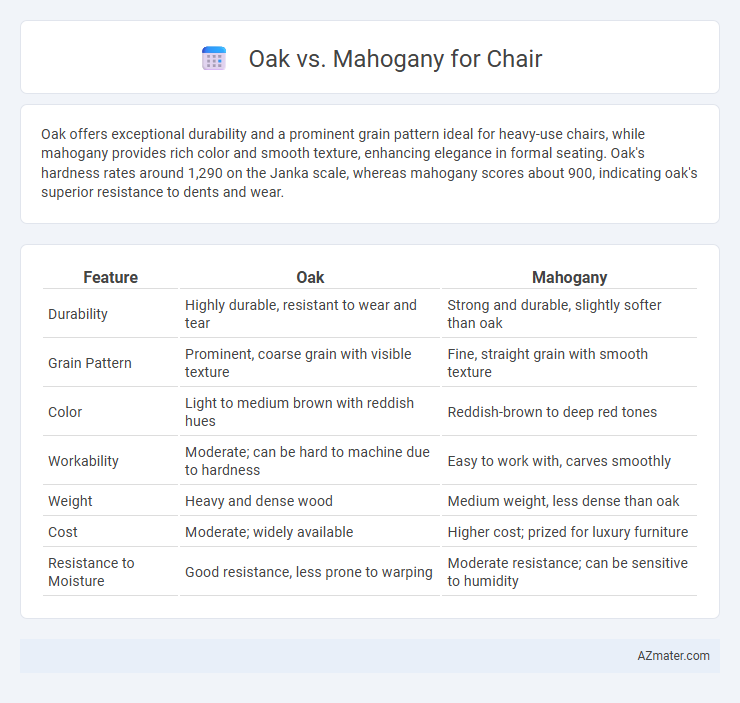Oak offers exceptional durability and a prominent grain pattern ideal for heavy-use chairs, while mahogany provides rich color and smooth texture, enhancing elegance in formal seating. Oak's hardness rates around 1,290 on the Janka scale, whereas mahogany scores about 900, indicating oak's superior resistance to dents and wear.
Table of Comparison
| Feature | Oak | Mahogany |
|---|---|---|
| Durability | Highly durable, resistant to wear and tear | Strong and durable, slightly softer than oak |
| Grain Pattern | Prominent, coarse grain with visible texture | Fine, straight grain with smooth texture |
| Color | Light to medium brown with reddish hues | Reddish-brown to deep red tones |
| Workability | Moderate; can be hard to machine due to hardness | Easy to work with, carves smoothly |
| Weight | Heavy and dense wood | Medium weight, less dense than oak |
| Cost | Moderate; widely available | Higher cost; prized for luxury furniture |
| Resistance to Moisture | Good resistance, less prone to warping | Moderate resistance; can be sensitive to humidity |
Introduction to Oak and Mahogany for Chairs
Oak is a hardwood renowned for its exceptional strength, durability, and distinctive grain patterns, making it a popular choice for sturdy chair frames that withstand daily use. Mahogany, prized for its rich reddish-brown color and smooth texture, offers excellent workability and a luxurious finish ideal for elegant and finely crafted chairs. Both woods provide unique aesthetic and functional qualities, influencing the longevity and style of chair designs.
Key Differences Between Oak and Mahogany
Oak is a durable hardwood known for its prominent grain patterns and light to medium brown color, offering excellent resistance to wear and moisture, making it ideal for sturdy chair construction. Mahogany features a smoother, fine grain with a rich reddish-brown hue, prized for its elegant appearance and natural resistance to rot and insects. The key differences between oak and mahogany for chairs lie in oak's robust hardness and visible grain texture versus mahogany's smoother finish and richer coloration, influencing both aesthetic appeal and durability.
Appearance and Grain Patterns
Oak chairs showcase a prominent, open grain pattern with distinct swirls and rays, offering a rustic yet classic appearance that enhances traditional and modern interiors alike. Mahogany features a smoother, tighter grain with rich reddish-brown hues that deepen over time, providing an elegant and luxurious finish suited for formal settings. The contrasting textures and color tones between oak's bold grain and mahogany's refined surface allow for varied aesthetic choices in chair design and decor coordination.
Durability and Strength Comparison
Oak offers exceptional durability and strength due to its dense grain structure, making it highly resistant to dents and scratches, ideal for chair construction. Mahogany, while also strong, provides a slightly softer texture that allows for easier carving but may be less resistant to heavy wear over time. Both hardwoods excel in longevity, but oak's superior hardness rating on the Janka scale ensures better performance under frequent use.
Weight and Workability
Oak is a dense hardwood known for its heavy weight, providing sturdy and durable chairs but requiring more effort to work with due to its hardness. Mahogany offers a lighter alternative, making it easier to handle and shape, ideal for intricate designs and detailed craftsmanship. Both woods are popular choices for chair construction, with oak favored for strength and mahogany for smoother carving and finishing.
Cost and Availability
Oak chairs are generally more affordable due to the widespread availability of oak wood, especially in North America and Europe, making it a cost-effective choice for furniture. Mahogany, being a premium hardwood sourced mainly from tropical regions, tends to be significantly more expensive and less readily available, often requiring importation. The cost difference between oak and mahogany is influenced by factors such as wood density, durability, and regional supply, with oak providing better accessibility for budget-conscious buyers.
Maintenance and Aging Over Time
Oak chairs require regular dusting and occasional oiling to maintain their natural luster and resist moisture damage, while mahogany chairs benefit from periodic polishing to preserve their rich, deep color and prevent drying or cracking. Over time, oak develops a distinct grain pattern that enhances its rustic charm, whereas mahogany darkens gracefully, deepening its elegant appearance. Both hardwoods offer durability, but oak's porous texture demands more proactive maintenance to avoid wear, while mahogany's dense structure ages with a smoother, more uniform finish.
Suitability for Various Chair Styles
Oak's durability and prominent grain make it ideal for rustic, traditional, and mission-style chairs where strength and visible texture are valued. Mahogany's fine, consistent grain and rich color suit elegant, classical, and Victorian chair designs, providing a smooth finish and refined appearance. Both woods accommodate detailed carving and shaping, but oak excels in sturdier designs while mahogany enhances sophisticated, ornamental styles.
Environmental Impact and Sustainability
Oak chairs offer a sustainable option due to oak trees' fast growth rates and widespread availability, which supports responsible forestry practices and carbon sequestration. Mahogany, often sourced from slow-growing tropical species, poses greater environmental concerns including deforestation and habitat loss, making it less sustainable in comparison. Choosing oak over mahogany for furniture production reduces ecological footprint and promotes sustainable timber harvesting.
Choosing the Right Wood for Your Chair
Oak offers exceptional durability and a prominent grain pattern, making it ideal for sturdy, long-lasting chairs that showcase natural beauty. Mahogany, prized for its rich, reddish-brown color and smooth texture, provides a luxurious finish and excellent resistance to warping, perfect for elegant and refined chair designs. Selecting between oak and mahogany depends on whether you prioritize robust strength and rustic appeal or a sophisticated, polished look.

Infographic: Oak vs Mahogany for Chair
 azmater.com
azmater.com